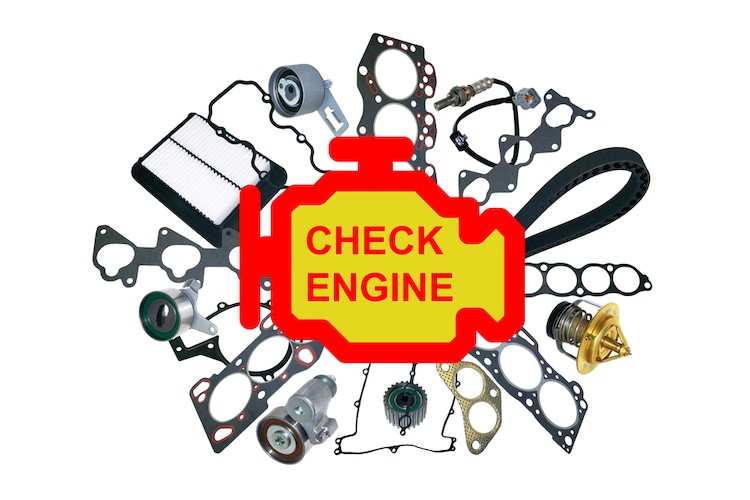Check Engine Light: Why It Comes on and What You Should Do
It may be the most misunderstood indicator on your dashboard, and that is the check engine light. Part of your car’s onboard diagnostic system, it comes on when it finds a problem it can’t correct.
It may either flash or remain static. In either case, something is amiss with your vehicle.
In this article, we break down the 7 main reasons your check engine light comes on and what to do if it does.
Check Engine Light: Static or Flashing
If you see a yellow check engine light on your dashboard, it does mean your vehicle needs mechanical attention. The good news is it’s most likely not something catastrophic like engine failure.
Still, you should take your car in for diagnostic tests ASAP. If the light is blinking, or if the light is solid red or orange, it’s a much bigger problem. You could have a mechanical problem that could cause immediate damage.
We do not recommend driving your car any further than you have to under these conditions. Get the car’s computer scanned for error codes as soon as possible. Once you know what the problem is, you can decide whether to continue driving or not.
Possible Causes the Check Engine Light Comes On
1-Gas Cap is Loose or Faulty
One of the most common reasons a check engine light is triggered is a loose gas cap! Your gas tank system is designed to recirculate gasoline vapors and to keep them from recirculating.
If the gas cap is loose or faulty, it can trigger the check engine light. It will also cause the vehicle to lose fuel from evaporation or for the fuel system to improperly circulate.
2-Catalytic Converter is Faulty
Besides triggering the check engine light, a faulty catalytic converter can reduce fuel economy, reduce performance, and increase emissions. But here’s the kicker. Replacing it may not keep the check engine light from coming on.
The cause of a catalytic converter failure is usually due to something else. For example, a blown head gasket which forces burnt coolant vapor into the exhaust system.
3-Mass Airflow Sensor is Faulty or Dirty
This sensor determines how much fuel is needed to run the engine, and it determines how much air is needed in the engine. If the mass airflow sensor is dirty or faulty, it can trigger the check engine light.
This sensor is susceptible to dirt and oil buildup, so sometimes a cleaning will fix the problem. If it doesn’t, you’ll need to replace it.
4-Spark Plugs are Worn
If your spark plugs aren’t firing correctly, it can cause not only an engine misfire but an increase in hydrocarbon emissions. The result? A weaker performance of the engine, and cause that pesky check engine light to come on.
5- Oxygen Sensor is Faulty
An oxygen sensor measures the amount of oxygen in the exhaust. If it’s not working properly, it can trigger the check engine light to come on.
6-Transmission Problems
Transmission problems can cause the check engine light to come on. This includes low transmission fluid, a slipping clutch, and a faulty torque converter.
7-Engine Problems
A problem with your engine will cause the check engine light to come on. This includes problems with the fuel system, pistons, and valves.
What If the Check Engine Light Comes on While Driving?
As we said earlier, we recommend pulling over as soon as you can. Then turn off the car. Check under the hood for any visible signs of problems.
If you can’t find anything, with the vehicle turned off, disconnect the battery for a few minutes. Reconnect it and start the vehicle. The check engine light should be gone. If not, take it to a mechanic as soon as possible.
Either way, your vehicle needs immediate attention. Don’t delay!
Conclusion
There are many reasons why your check engine light could come on. It could be as simple as a loose gas cap to as dangerous as an engine problem. Pull over as soon as you can.
If you have a diagnostic scanner, use it to determine the severity of the problem. That will tell you whether it’s safe to continue driving for a short distance or whether to call for help.
Keep your vehicle in tip top shape with Joe Bowman Auto Plaza’s Chevy-certified technicians. These highly skilled mechanics work on all makes and models and are committed to keeping you safe on the road. Learn more about our Harrisonburg, VA dealership here.
It may either flash or remain static. In either case, something is amiss with your vehicle.
In this article, we break down the 7 main reasons your check engine light comes on and what to do if it does.
Check Engine Light: Static or Flashing
If you see a yellow check engine light on your dashboard, it does mean your vehicle needs mechanical attention. The good news is it’s most likely not something catastrophic like engine failure.
Still, you should take your car in for diagnostic tests ASAP. If the light is blinking, or if the light is solid red or orange, it’s a much bigger problem. You could have a mechanical problem that could cause immediate damage.
We do not recommend driving your car any further than you have to under these conditions. Get the car’s computer scanned for error codes as soon as possible. Once you know what the problem is, you can decide whether to continue driving or not.
Possible Causes the Check Engine Light Comes On
1-Gas Cap is Loose or Faulty
One of the most common reasons a check engine light is triggered is a loose gas cap! Your gas tank system is designed to recirculate gasoline vapors and to keep them from recirculating.
If the gas cap is loose or faulty, it can trigger the check engine light. It will also cause the vehicle to lose fuel from evaporation or for the fuel system to improperly circulate.
2-Catalytic Converter is Faulty
Besides triggering the check engine light, a faulty catalytic converter can reduce fuel economy, reduce performance, and increase emissions. But here’s the kicker. Replacing it may not keep the check engine light from coming on.
The cause of a catalytic converter failure is usually due to something else. For example, a blown head gasket which forces burnt coolant vapor into the exhaust system.
3-Mass Airflow Sensor is Faulty or Dirty
This sensor determines how much fuel is needed to run the engine, and it determines how much air is needed in the engine. If the mass airflow sensor is dirty or faulty, it can trigger the check engine light.
This sensor is susceptible to dirt and oil buildup, so sometimes a cleaning will fix the problem. If it doesn’t, you’ll need to replace it.
4-Spark Plugs are Worn
If your spark plugs aren’t firing correctly, it can cause not only an engine misfire but an increase in hydrocarbon emissions. The result? A weaker performance of the engine, and cause that pesky check engine light to come on.
5- Oxygen Sensor is Faulty
An oxygen sensor measures the amount of oxygen in the exhaust. If it’s not working properly, it can trigger the check engine light to come on.
6-Transmission Problems
Transmission problems can cause the check engine light to come on. This includes low transmission fluid, a slipping clutch, and a faulty torque converter.
7-Engine Problems
A problem with your engine will cause the check engine light to come on. This includes problems with the fuel system, pistons, and valves.
What If the Check Engine Light Comes on While Driving?
As we said earlier, we recommend pulling over as soon as you can. Then turn off the car. Check under the hood for any visible signs of problems.
If you can’t find anything, with the vehicle turned off, disconnect the battery for a few minutes. Reconnect it and start the vehicle. The check engine light should be gone. If not, take it to a mechanic as soon as possible.
Either way, your vehicle needs immediate attention. Don’t delay!
Conclusion
There are many reasons why your check engine light could come on. It could be as simple as a loose gas cap to as dangerous as an engine problem. Pull over as soon as you can.
If you have a diagnostic scanner, use it to determine the severity of the problem. That will tell you whether it’s safe to continue driving for a short distance or whether to call for help.
Keep your vehicle in tip top shape with Joe Bowman Auto Plaza’s Chevy-certified technicians. These highly skilled mechanics work on all makes and models and are committed to keeping you safe on the road. Learn more about our Harrisonburg, VA dealership here.


